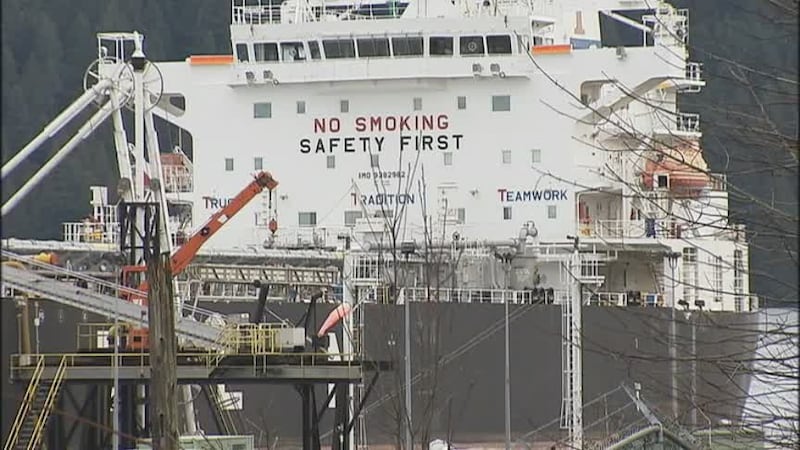BURNABY, British Columbia — At the Westridge Marine Terminal near Vancouver, BC, ships load oil from the Trans Mountain Pipeline.
The pipeline starts 715 miles inland, across the Canadian Rockies, in Edmonton, Alberta.
Increasingly, it carries heavy tar sands crude.
"We're in the business of the safe transportation of petroleum," said Michael Davies, senior director for marine development for Kinder Morgan, the company that owns the pipeline.
Kinder Morgan wants to expand the pipeline from a capacity of 300,000 barrels per day to 890,000 barrels, so the crude can be shipped to Asia.
A $6 billion expansion would mean more tankers leaving Vancouver, traveling past the San Juan Islands, and out the Strait of Juan de Fuca.
Right now five ships per month can load at the facility. If the expansion goes through, that number will jump to as many as 34.
"I think the project can operate safely and provide a significant benefit to Canadians," Davies said.
That claim is in serious dispute.
The pipeline is fiercely opposed by First Nations and environmental groups worried about oil spills.
They staged protests outside federal permit hearings.
Last month, the British Columbia provincial government came out against expansion.
There is also increasing alarm south of the border.
"This is the single biggest risk to our waterway that nobody knows about," said Fred Felleman, a consultant for Friends of the Earth and recently-elected commissioner at the Port of Seattle.
Felleman, who spoke to KIRO 7 in his role as environmental consultant, said activists are largely focused on the risks of oil trains.
Felleman points to an oil spill risk assessment by George Washington University, which is currently being updated for the Washington Department of Ecology.
The study focused on additional marine traffic from an expansion of the Trans Mountain Pipeline and two other projects.
The study found an increased oil spill risk of 68 percent throughout Northern Puget Sound and the Strait of Juan de Fuca. In Haro Strait and Boundary Pass, the study predicted a risk increase of 375 percent.
Felleman said that route is prime feeding grounds for endangered killer whales.
"This is clearly a recipe for disaster," Felleman said.
Kinder Morgan maintains it is ready for any oil spill.
It contracts with Western Canada Marine Response Corporation, which cleans up spills.
A warehouse in Burnaby is filled with cleanup equipment, including booms.
"This has to be ready to go all the time," said Lee Hammond, WCMRC's operations director during a tour.
Kinder Morgan executives say if the pipeline expansion is approved, the company will spend $100 million on more spill response.
Michael Davies said the response time would be cut in half, and the cleanup capacity would be doubled, with five new bases along the tanker route for spill response boats and equipment.
"There are all the elements for a world-leading marine safety regime here in Canada, very similar to what you have in the United States," Davies said.
Right now, there is much more response equipment based in the United States.
Western Canada Marine Response says it has contracted with the smaller of two U.S.-based response organizations for mutual aid, National Response Corporation.
The larger U.S. based organization, Marine Spill Response Corporation, tells KIRO 7 it does not have a contract with Kinder Morgan.
KIRO 7 asked Senator Maria Cantwell (D-Washington) if the Canadians are sufficiently prepared to handle oil spills.
Her answer: "No."
Cantwell said the problem is the type of oil coming from the tar sands, a heavy crude called diluted bitumen.
"This is not the Exxon Valdez," Cantwell said. "It's worse because the product will sink."
In 2014, during a Senate hearing for the then-nominee for Coast Guard commandant, Admiral Paul F. Zukunft, Cantwell asked Zukunft about readiness for oil spill cleanup.
He responded that there's good technology to remove oil from the surface, but "once it settles on the sea floor our technology is lacking."
"With the Coast Guard saying they don't have a plan to deal with it, we shouldn't take the risk," Cantwell told KIRO 7 in January.
Bitumen sank during a spill in Michigan's Kalamazoo River in 2010.
Kinder Morgan says in its testing, bitumen floated 10 days, long enough for cleanup.
The company says spills are prevented with two local pilots on every ship and tethered escort tugs through critical areas.
Kinder Morgan says if pipeline expansion is approved, tugs will start following every outbound ship all the way through the Strait of Juan De Fuca.
Kinder Morgan says the extra protection would match the extra risk of moving from about one oil tanker per week to one per day.
Felleman questioned why the company wasn't already doing escorts.
"If they are inclined to provide additional protection, it should be in place currently," Felleman said.
Felleman also said that a tug escort agreement with Kinder Morgan might not extend to the shipping companies who actually move the oil.
"Because they don't own those ships, it's a clear possibility the ships could say 'thank you very much but we'll take it from here,'" Felleman said.
Joe Raymond, the U.S. Coast Guard's sector commander and captain of the port, says the downside of a long tug escort is that it would slow the tankers.
"You might actually have tanker in the system longer which unfortunately would probably increase some risk," Raymond said.
Raymond said the Salish Sea can easily handle more tanker traffic, and he has no worries about responding to spills.
If a spill moved in to U.S. waters, Raymond has the option of federalizing the spill, allowing the federal government to pay for resources out of the Oil Spill Liability Trust Fund.
Raymond said the National Pollution Funds Center would then seek to recover the cost of cleanup from the party responsible for the spill.
Raymond stressed that shipping technology, with double-hulled oil tankers and GPS tracking, has made collision avoidance easier and spills less likely.
Cox Media Group








